TEACHING AND LEARNING
RiSING TO THE CHALLENGE
TEACHING AND LEARNING
RiSING TO THE CHALLENGE
Teaching and learning
Rising to the Challenge
Teaching And Learning
Rising to the Challenge
The double whammy of social unrest and COVID-19 created unprecedented disruptions to teaching and learning in 2019–20. But thanks to an enormous effort by our teachers and supporting units – and a spirit of innovation – learning and assessment maintained their normal schedules and top students continued to choose HKU.
Universities around the world have been tested by the restrictions on in-person teaching due to the COVID-19 pandemic, but at HKU our challenges started earlier, in November 2019. Political protests led us to move classes and assessment online, in what turned out to be a trial run for 2020. Fortunately, we were not caught unprepared.
Shortly before the November closure, we completed a scheduled review of e-learning at HKU, which revealed most courses were already connecting to students online. Our Information Technology Services (ITS) had also developed e-learning infrastructure with great potential for expansion. The missing piece was assessment, which was quickly addressed with OLEX, the HKU Online Examination System developed by ITS and our Examinations Office in just two weeks. The solutions were not perfect, but they enabled the semester to be completed as scheduled.
Importantly, lessons were learned that we were able to apply in 2020 when, apart from just one week of face-to-face teaching and a few weeks in summer, classes remained online until late September.
Drawing on Experience: One key lesson was that teachers needed more support. When COVID-19 hit, more than 70 how-to videos and webinars for online teaching and learning were developed by our Technology-Enriched Learning Initiative using simple technologies and a system set up to provide assistance to individual teachers (see Tech’s Time to Shine). To support the pivot to re-designing courses for online and hybrid learning, the Centre for the Enhancement of Teaching and Learning (CETL) organised the Education 4.0 seminar series where international curriculum leaders shared experiences with more than 1,700 participants from more than 20 countries; the Summer Sandbox series that helped more than 100 HKU course coordinators re-design for online learning from the outset; and the ‘Dual Mode’ seminars to share good teaching practices across the University. The boost to CETL’s online resources following these initiatives attracted 1.5 million visits to its website from August to November 2020.
Some examinations still needed to be held in person, particularly clinical assessments that were needed to fulfil professional requirements. The Li Ka Shing Faculty of Medicine developed stringent infection control protocols such as requiring students and staff to submit health declaration forms, separating candidates’ seats by a two-metre radius, and arranging COVID-19 polymerase chain reaction (PCR) tests for all participants in clinical examinations involving physical contact. These examinations proceeded smoothly.
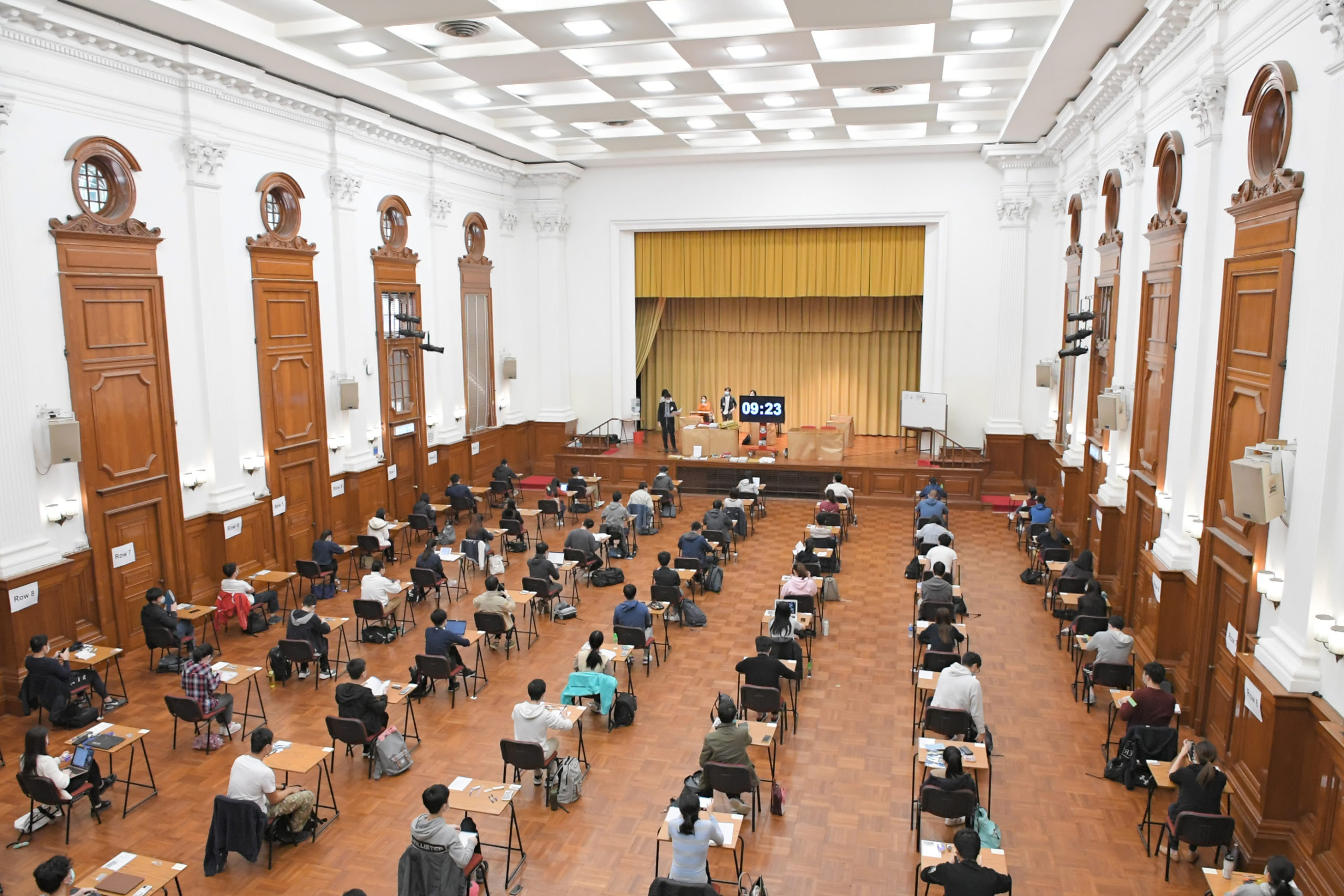
Spatial separation of seating arrangement was adopted in Loke Yew Hall and other examination venues.
New Normal: The rest of the campus, meanwhile, was being prepared for safe face-to-face classes, which became an option for many courses from September 22. Classrooms operate at a maximum 50% capacity to maintain social distance, and mask-wearing is compulsory. Ventilation, cleansing and other measures have been enhanced. Clinical training has also resumed – for instance, the Faculty of Dentistry has heightened infection control measures and introduced regular testing of staff and students and other protocols. All classes also continue to be offered online. This is especially important for non-local students who cannot yet travel to Hong Kong. The annual Inauguration Ceremony for New Students was held online on August 31 to ensure students everywhere could be part of this important ritual of entry to HKU.
Opportunities have also been developed to enrich the university experience as far as the online environment can allow. The Centre of Development and Resources for Students (CEDARS) moved many of its activities online, such as a virtual career fair, counselling, orientation for international students and volunteering in the community (see Orientation and Volunteering Take to Zoom). The Common Core published Unforeseen Circumstances, its first online ‘journal + exhibit space’, which was edited and written by students; live-streamed its Student Learning Festival; and launched workshops on skills relevant to the post-COVID economy through its Passion Project: Creating Work You Love, Critical Zones: Gender, Cities and Well-Being, and through its engagement with the U21 RISE (Real Impact on Society and Environment) Video Competition.
These activities cannot fully replicate all the opportunities that arise from being on campus in person. It is hoped a continued return to campus teaching – and a resumption of student exchanges and internships in 2021 if possible – will further enrich the student experience.
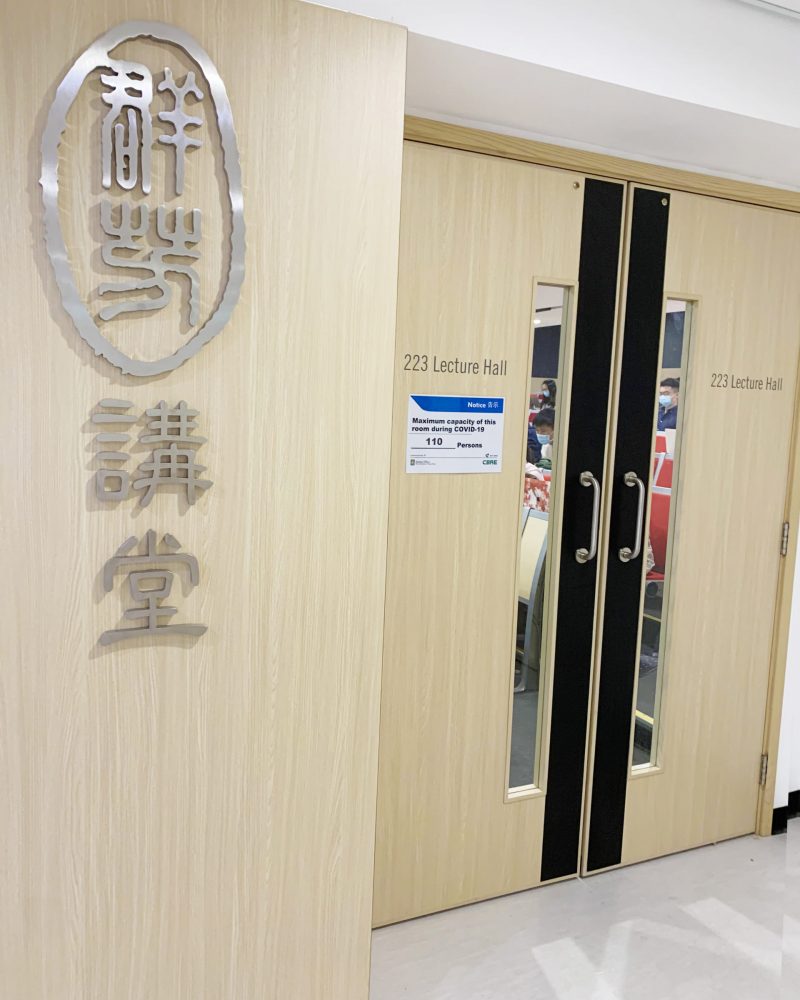
All classrooms operate at a maximum 50% capacity to maintain social distance.
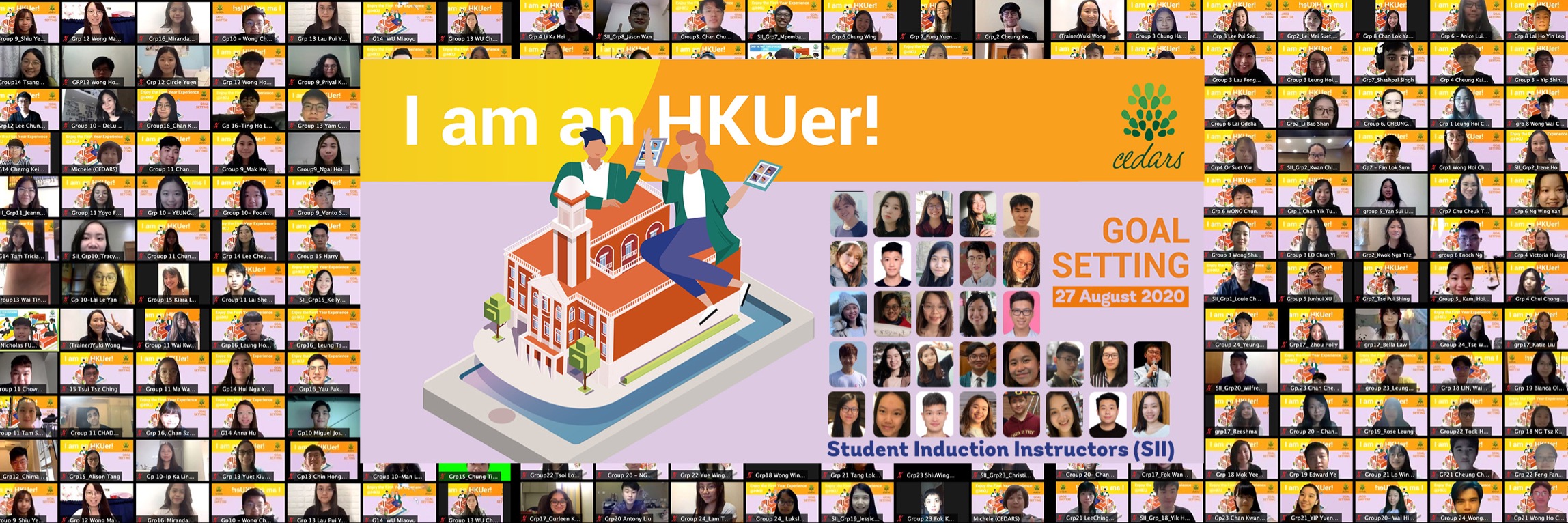
The Centre of Development and Resources for Students moved many activities online.
Excellence Sustained: The disruptions did not dent HKU’s reputation for excellence. Teaching excellence received external recognition (see EXCELLENCE) and top students continued to choose HKU, including three of the five top scorers of the Hong Kong Diploma of Secondary Education Examination. We also admitted more than 700 students from Mainland China and overseas, including two provincial top scorers in the Gaokao examinations, 16 top scorers in the global International Baccalaureate exams and 24 top scorers in the GCE A-level exams. Students from 38 nationalities were admitted.
To support students in what was a difficult year, we launched new scholarships in 2020, including the HKU REACH (Recognition of Achievements) Awards for local students in Nursing, Education and Social Work, the HKU Aspiration Scholarships for outstanding students to explore Arts and Social Sciences options, and the HKU FLY (Future Leaders of the Year) Scholarships for outstanding first-year students in the Bachelor of Arts and Sciences (BASc) programmes.
Three new programmes were also announced: the HKU-Cambridge Undergraduate Recruitment Scheme (Natural Sciences) and the HKU and UC Berkeley dual degree programme in Arts and Social Sciences, through which top students can acquire degrees from two universities, and the Global Engineering and Business Programme at HKU, offered jointly by the Business and Engineering Faculties. These degrees, which cross disciplinary and national borders, will prepare graduates to deal with the very complex challenges facing today’s world.
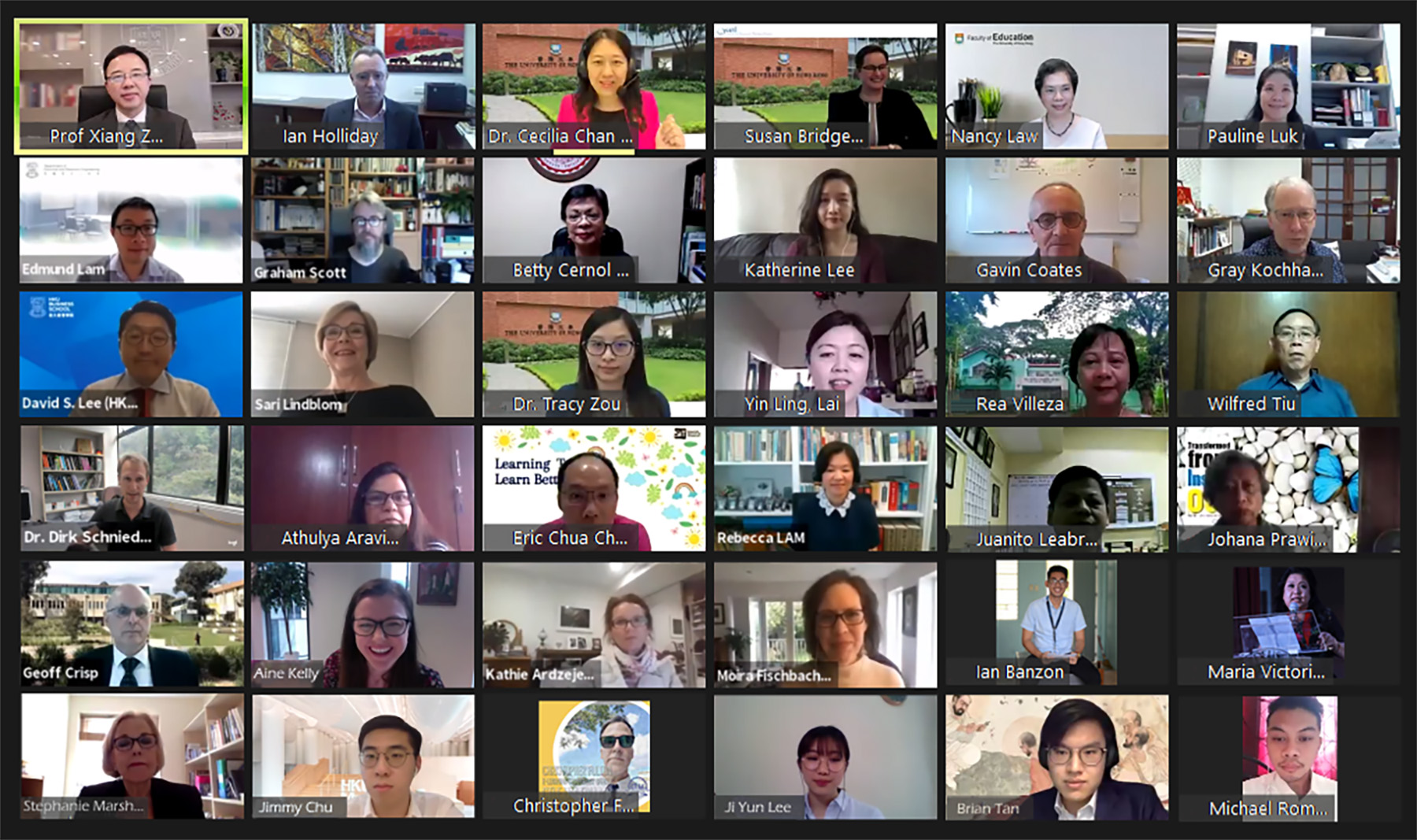
The International Virtual Forum in Teaching and Learning: Students-as-Partners in Online Learning – Voices from HKU gathered students, teachers, and senior leaders to discuss online learning in the current challenging time and its impact on higher education in the coming years.

3 of 5
HKDSE top scorers
Three of the five students who scored 5** in seven subjects chose HKU and were admitted through the JUPAS system.

Nationalities
Students came from places as diverse as Israel, Turkey, Belarus, Ghana and Mexico.

Students from Mainland China and overseas
Admission and application levels remained strong.
INNOVATION
New ways to deliver content and enrich student life are being tried out in the wake of COVID-19.
Jumpstarting Telemedicine
Dr Anderson Tsang Chun-on of the Department of Surgery first encountered telemedicine consultations while studying in Canada, where it was used for patients living in remote rural areas. That exposure inspired him to try it out at HKU during the COVID-19 closure. He adapted bedside teaching and clinic sessions so students could consult patients via video during lockdown and continue to refine their skills.
Clad in white coats, final-year Bachelor of Medicine and Bachelor of Surgery (MBBS) student Ho Yik-to and her classmates took patient histories and performed simple neurological examinations over Zoom. For example, they were able to modify the finger-nose test in which patients touch their nose with their finger and then touch the examiner’s finger. “Before, I wouldn’t have thought that this test could be performed virtually because it involves direct interaction between the patient and the examiner.
But with slight modification, we were able to obtain useful information from the test despite not seeing the patient face to face. Telemedicine has its limitations, but it also encourages us to think out of the box.”
Her classmate Verma Rohit Kumar said telemedicine helped ensure their skills could continue to develop and it even improved on some aspects of in-person learning. For instance, he joined an operating theatre session in which groups of students spent half the time watching brain surgery via video link from a conference room and the other half in the operating theatre, where Dr Tsang had a camera mounted on his head. “It actually gave us a better view than being there in person and he communicated with students in both places,” Rohit said. “This was all very valuable experience for me.”
Dr Tsang is drawing on these experiences to integrate telemedicine into the MBBS curriculum, with support from a Teaching Development Grant. “The pandemic has catalysed the adoption of telemedicine. Aside from the obvious advantage of enabling clinical teaching to continue, it has provided an opportunity for students to learn telemedicine consultation skills, which will become more important in future.”

MBBS students (in the TV) carrying out telemedicine consultation and examination on a patient in the neurosurgery clinic at Queen Mary Hospital.
A ‘Take-home’ Lab
Laboratory work was one area where teachers had to be creative during the COVID-19 closure. Dr Lui King-shan and Dr Sam KH Lam’s Integrated Design Project course, for instance, focusses on getting Electrical and Electronic Engineering students to work in teams in the laboratory to produce an automatic vehicle system. How can that be achieved when they are told not to come to campus?
The teachers’ workaround was to quickly develop video lectures and instructions that were uploaded online, to adapt laboratory experiments so they could be done at home, and to arrange for packets of key components to be sent to students so they could complete their project at home. Students who were stuck overseas were provided with simulators to complete the work. “It was not perfect, but I think most of our course requirements were fulfilled,” Dr Lui said. “Students were still assessed according to our original plan. The major difference was we watched a lot of videos instead of real-time demonstrations and there was not much chance for us to ask questions. But the students were very understanding and patient.”
They also felt the experience deepened their learning. Fourth-year student Gary Choi Ki-hin said: “The lecture videos were beneficial for self-learning, which is also an essential and critical skill.” 2020 graduate Molly Rathore, who was in India at the time, had additional challenges in getting a computer compatible with the simulator and dealing with errors, but she succeeded in the end. “Some of the tasks I simulated were developing a robotic car with features like obstacle detection and warning system and a Bluetooth car. It required a lot of additional research and this was great learning for me. The course was designed with a lot of thought and it was one of the most interesting courses I took at HKU.”

The simulation used to understand the system.
Orientation and Volunteering Take to Zoom
One of the biggest impacts of COVID-19 has been the damper on extracurricular activities that enrich the university experience. The Centre of Development and Resources for Students (CEDARS) has found a creative get-around that gives students these opportunities and helps them connect with each other, through online delivery of its Non-Academic Induction programme.
When the new academic year kicked off in September 2020, the programme accommodated 258 students who participated in such things as ‘speed friending’ (rotating through chat rooms to meet new people), goal setting sessions, inspirational activity sessions and an Instagram challenge about adjusting to life as university students. About 30 current students were recruited to help facilitate newcomers through these activities. There were also online induction talks, attended by about 1,900 students, and an online Weeks of Welcome for international students.
A volunteering programme to connect students with the children of former inmates was also moved online. In spring and summer sessions, student volunteers held Zoom sessions with the children to teach them fun educational activities such as making their own ice cream and a balloon rocket. The children, aged 5–12, were at home because schools were closed due to COVID-19. They were identified with the help of the Society of Rehabilitation and Crime Prevention.
Gessy Li, a second-year Master of Social Work student, said the timing of the programme worked well. “We were all trapped in our own homes and feeling isolated and powerless, so when this virtual service opportunity came, I realised there was always a way to spread love and care. I was also interested to learn more about rehabilitated people and their families,” she said. There were other benefits for HKU participants, too. “We acquired some new skills, such as knowing how to place camera angles so your audience can see you and making use of breakout rooms for personalised instructions. It was surprising how much could be done virtually.”
Second-year Bachelor of Laws student Sam Lee Cheuk-ming said the experience gave him insights about these children. “I used to think that children of former inmates had low self-esteem because of who their parents are, but that is entirely not true. They were just like normal children, they don’t like being bored and they like asking why, how, what and when.”
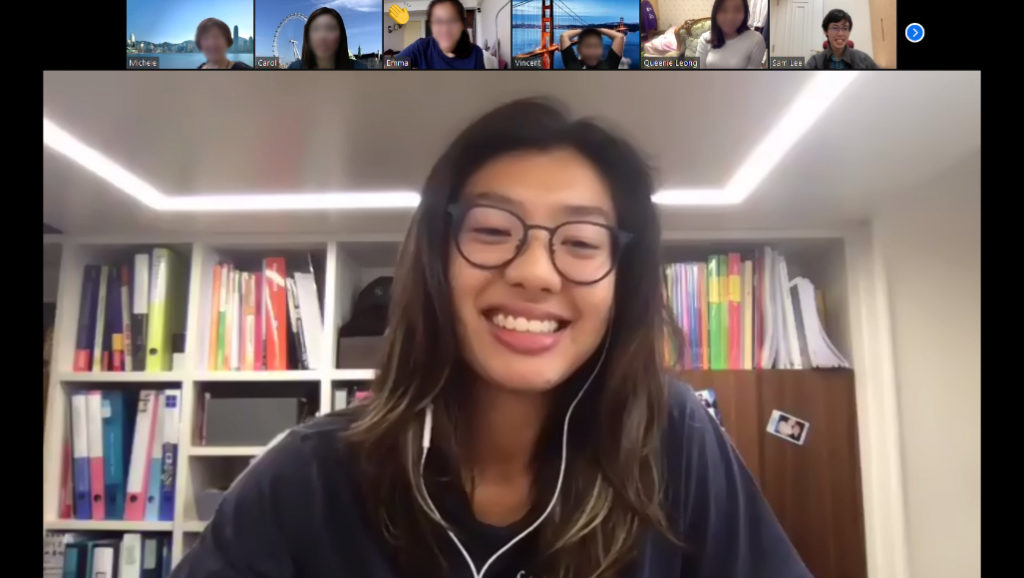
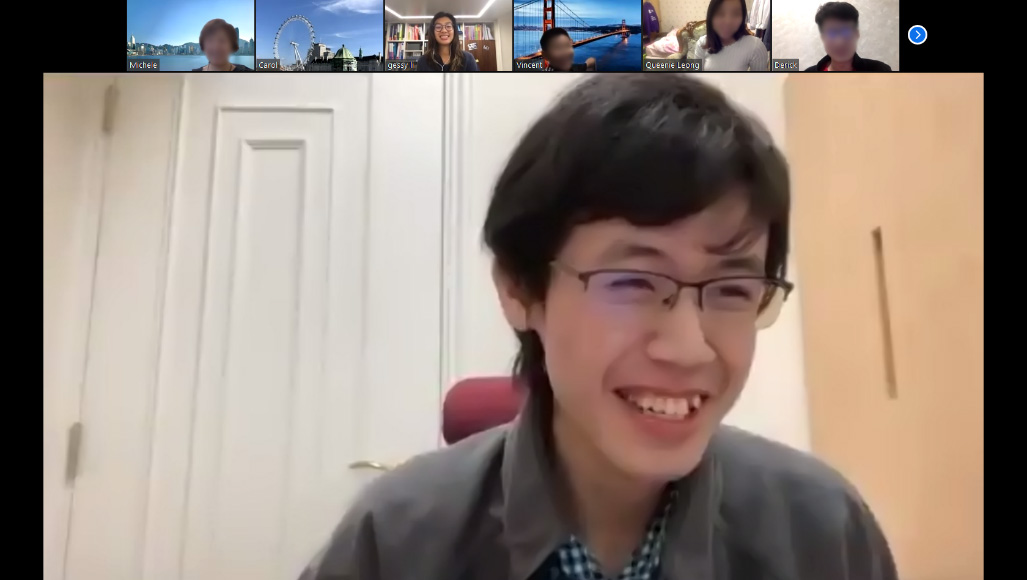
Student volunteer Gessy (left) and Sam (right) held Zoom sessions with the children of former inmates to teach them fun educational activities.
Student volunteer Gessy (top) and Sam (bottom) held Zoom sessions with the children of former inmates to teach them fun educational activities.
ADAPTATION
Where e-learning was already being applied, COVID-19 opened new avenues to expand and experiment.
Ready to Leap
The move to online learning did not catch Dr Vichy Ho Wai-chi of the School of Chinese unprepared. For the past five years, he has been embracing the possibilities of learning and teaching online. With COVID-19, he was able to take this to the next level.
Dr Ho first started developing what he calls ‘homemade videos’ in 2015 for his courses and in 2017 received a Teaching Development Grant (TDG) on the flipped classroom, which enabled him to enhance the standard of his videos. “The courses where I was course coordinator were 100% ready to be flipped by the 2018–19 academic year,” he said. In 2019 he was part of a team that received another TDG on experiential learning, which consists of a ‘super website’ to offer online language support with videos, databases and exercises.
In the wake of the campus closure, he decided to record and edit all his lectures for students to use in revision and he made use of the VideoVox system invented by Professor Michael Botelho of the Faculty of Dentistry that uses time stamps, tags and data analytics to make videos more interactive and multifunctional. Dr Ho also uses WhatsApp during live Zoom sessions to enhance communication with students and has weekly Instagram Live sessions. Using all these tools, he held his first course entirely online in 2020 and received his highest-ever marks in student evaluation.
“This is proof that online learning can be even better than face-to-face if teachers and students treat it seriously,” he said. “Students are the centre of learning and they are far more adaptive to learn online than teachers. My conclusion is that we should emphasise ‘online learning’ rather than ‘online teaching’.”
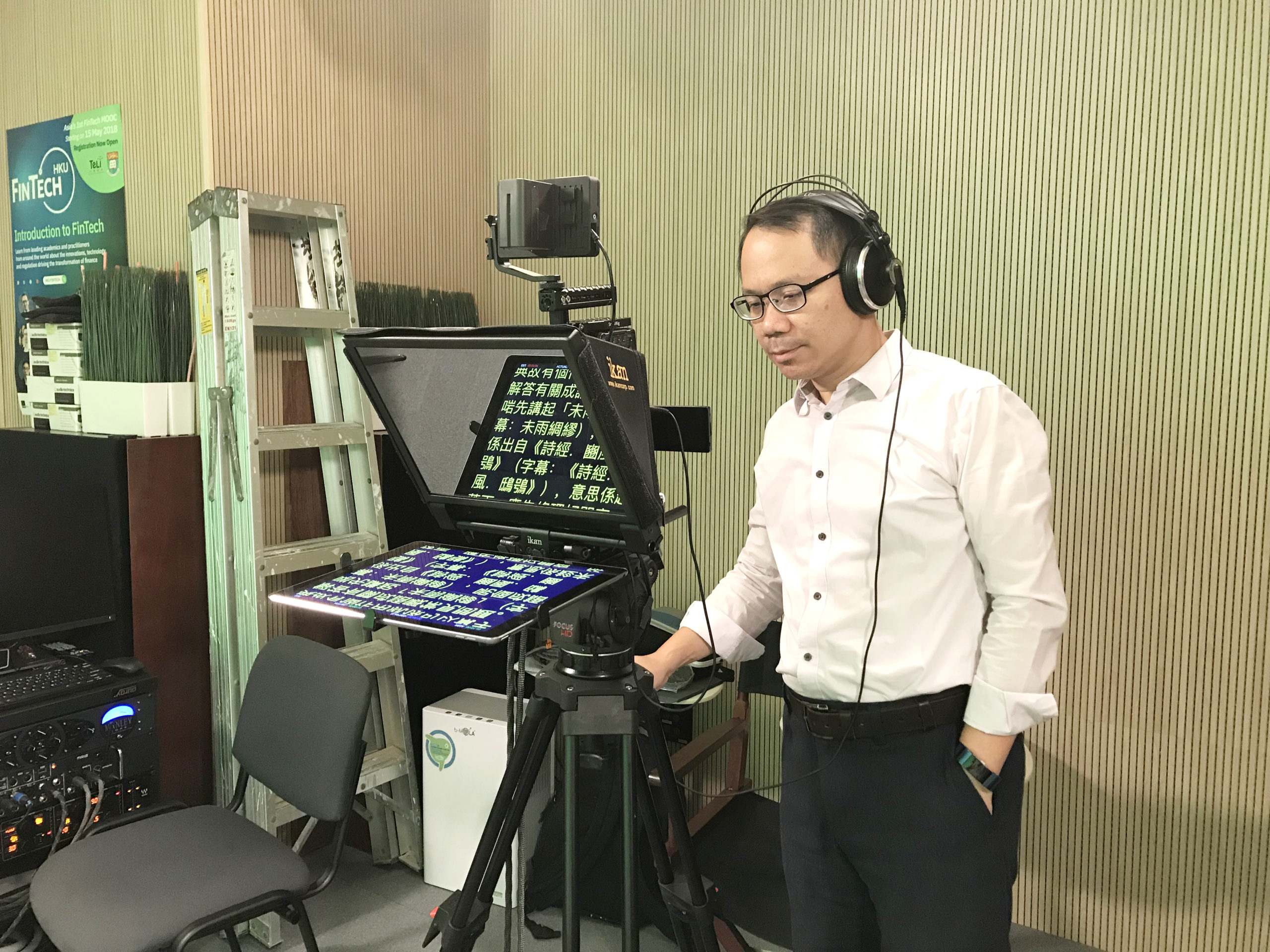
Dr Vichy Ho is keen to integrate technology and pedagogy to flip his classroom.
Taking a Virtual Field Trip
Field trips are central to programmes like Landscape Architecture, where students need to see real-life applications of the lessons they are learning. So division head Mr Mathew Pryor and colleague Mr Gavin Coates were determined that the COVID-19 restrictions would not get in the way of delivering their lessons.
The pair developed virtual field trips to sites they would normally take classes to in person, with support from HKU’s Digital Literacy Laboratory and teaching assistants. The trips were live-streamed and recorded and accommodated real-time communication with students.
“Landscape happens outside, it is a very tactile experiential subject, and we were very keen to continue to let students feel the landscape even in online classes. Gavin and I had been creating course videos for some years, so we saw it as an extension of that process,” Mr Pryor said.
They visited sites on campus, in urban areas and across the New Territories for undergraduate, postgraduate and Common Core courses, and for groups ranging in size from 15 to 160. Students were not only able to watch these trips live, but also follow the progress on Google Earth or Google Street and simultaneously research the subjects being covered. “There are advantages to this approach – everyone has the same access, they can see and hear clearly unlike being there in person, recordings can be annotated, and it is easier to ask questions,” Mr Pryor said.
Jessica Tsim, a student in Postgraduate Diploma in Landscape Architecture, followed a site walk on urban trees at HKU and another in Wan Chai to trace its historical development. “Although the experience is weaker online, it had good points like saving time and being able to jot notes online and research related information. I was able to Google a tree species that was new to me during one session,” she said. She also followed up on her own time to visit some of these sites in person and reinforce her learning.
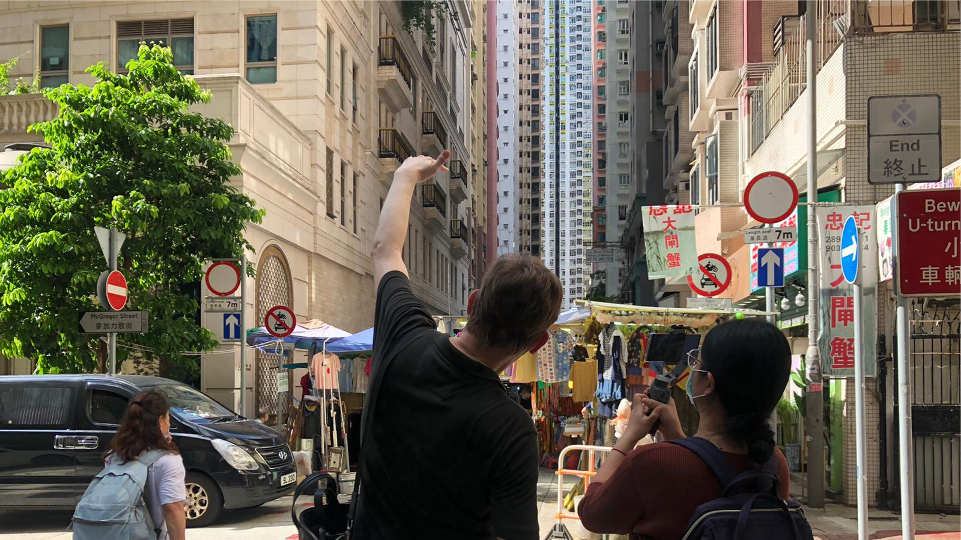
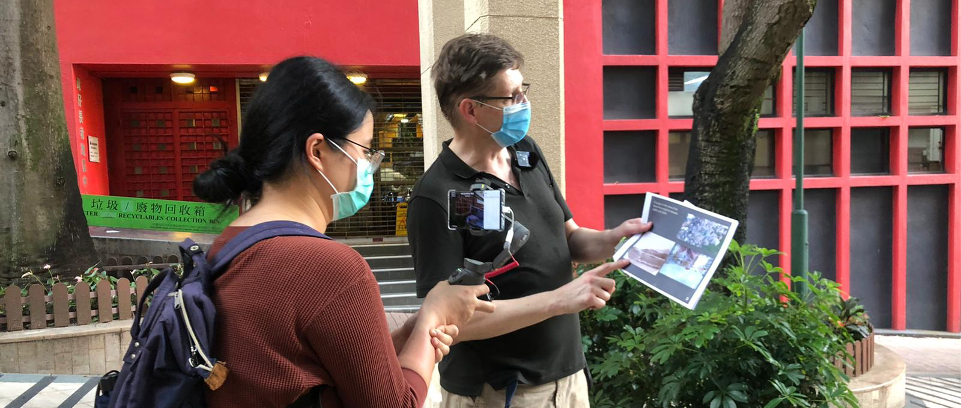
Mr Mathew Pryor taking Landscape Architecture students on virtual field trips in and around Hong Kong.
Tech’s Time to Shine
The rapid shift to online learning put the spotlight firmly on HKU’s tech support. The Technology-Enriched Learning Initiative (TELI), which previously provided training on a small scale and through individual consultations and produced high-quality MOOCs (massive open online courses), found itself doing a 180-degree turn. It now had to serve all teachers and get them quickly up to speed on simpler technologies, such as Zoom and Microsoft Teams, so they could produce their own videos and conduct lectures online. This meant creating a lot of original training materials and resources for both staff and students within a few weeks.
Since the beginning of the year, TELI has produced more than 70 videos that have had more than 20,000 views. A five-part webinar series on the virtual flipped classroom was also organised for teachers, and facilities were set up at studios in Chi Wah Learning Commons so teachers could record their own videos. The team also established a quick-response system through WhatsApp that responded to teachers’ messages within 10 minutes and they provided individual Zoom and in-person training as needed. An example of the assistance they gave was helping a mathematics professor capture blackboard writing on camera, which required testing different cameras and settings (a mobile phone proved the best option).
TELI also produced six webinars for teachers, proctors and students to provide advice and training in using the HKU Online Examination System, OLEX, which was developed by the Information Technology Services and Examinations Office. Together, the three units answered more than 1,000 questions through the webinars.
Dr Leon Lei, E-learning Technologist with TELI, said the work they had done prior to the campus closure was key to their success. “It gave us the confidence and competency to scale up and it also provided examples to showcase to other teachers,” he said.
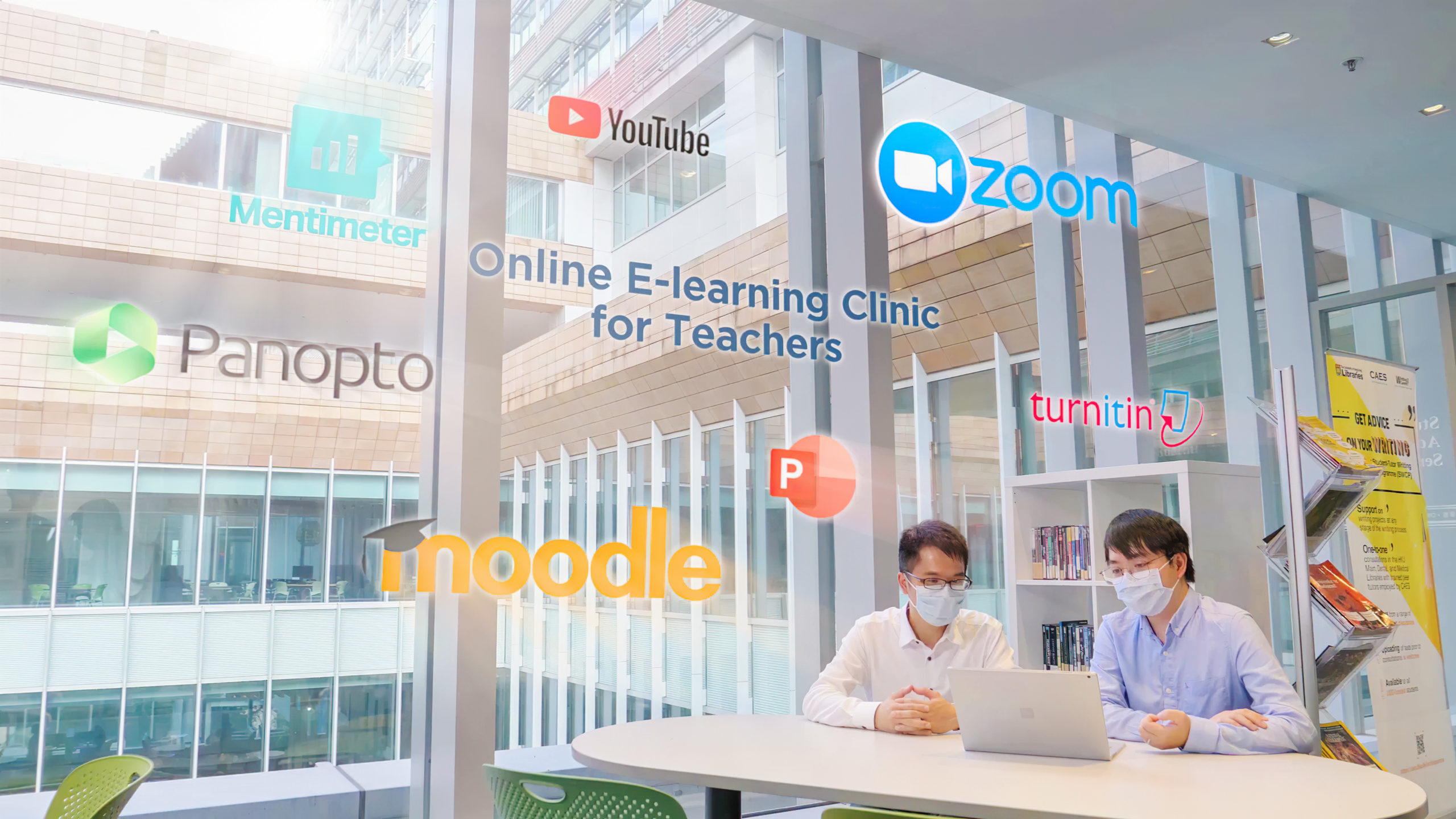
Technology-Enriched Learning Initiative (TELI) provides training and professional advice to teachers through a series of videos and webinars, to assist them in delivering quality teaching online.
EXCELLENCE
Recognition was received and given for teacher and student achievements.
International Honours for Education Team
A belief that student teachers should learn in the community as well as the classroom helped the Experiential Learning (EL) team from the Faculty of Education win the Gold Award in the Presence Learning and Teaching Category at the 2020 QS Reimagine Education Awards, the ‘Oscars’ of education.
The team, led by Dr Gary Harfitt, have integrated EL into all programmes in the Faculty, including a mandatory requirement for undergraduate students – the first in Hong Kong and Asia to do so. Since 2016, more than 1,400 students have enrolled in 16 credit-bearing EL courses that range from mentoring local underprivileged children to working with partners in countries such as Cambodia and Sri Lanka. “We have long believed that there is another knowledge space beyond HKU’s classrooms and lecture halls where our teachers-to-be can learn about how to ‘become’ a teacher – namely the community,” he said.
Boris Lau Ho-kiu, a fifth-year student of Bachelor of Arts and Bachelor of Education in Language Education (English), has been to Cambodia to develop sustainable teaching tools for students there, mentored a secondary school student in Yuen Long, and helped create educational games about environmental conservation at Ocean Park. “The most important thing I have learned is that teaching and learning can happen anywhere, and that with that, we also understand more about our students,” he said. Since his Cambodia EL in his first year, he has also been involved with a student-initiated group, Beyond Belief, that has built a playground for a school in Siem Reap and a house there for a family without parents.
Gary Wong Yu-yeung, a fifth-year Bachelor of Education and Bachelor of Science student, joined EL programmes in Thailand and Tibet and others in Hong Kong on design thinking and developing STEM / STEAM-related materials and activities for secondary school students. These experiences propelled him to set up a climate advocacy group that aims ultimately to improve understanding of climate change in the local education curriculum. “EL makes learning realistic and meaningful,” he said.
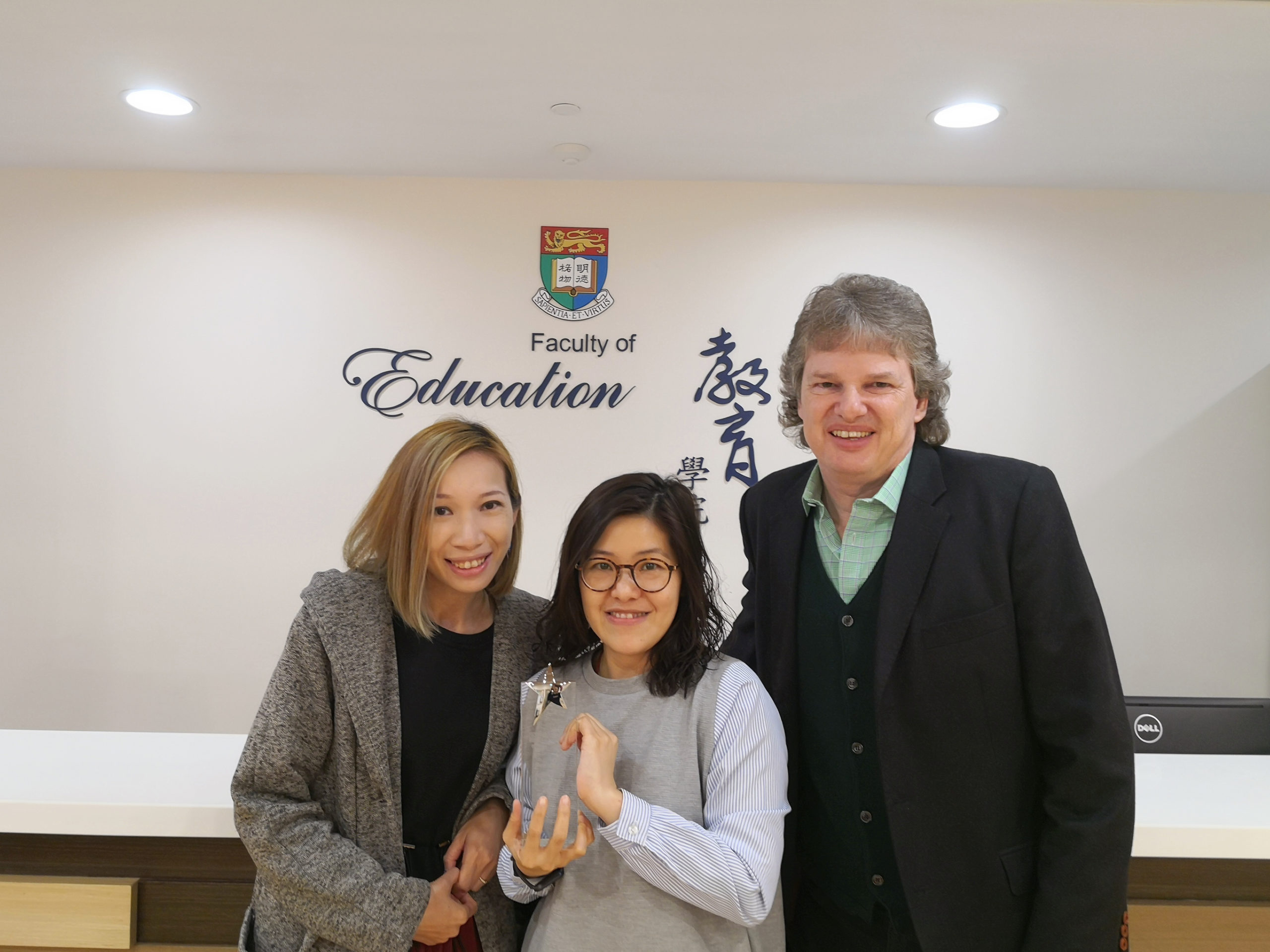
The Experiential Learning team – (from right) Dr Gary Harfitt, Ms Jessie Chow and Ms Ivy Chung – were awarded for the project ‘Nurturing a twenty-first century teaching force through community-based experiential education’.
Early Career Award for Business Lecturer
Experience outside academia – in consulting, law, entrepreneurial ventures and finance – has given Mr David S Lee of the Faculty of Business and Economics (HKU Business School) a deep appreciation of the value of teaching. He has put that insight to productive use with his students and in September 2020, was awarded the University Grants Committee’s Teaching Award for Early Career Faculty Members. Only one teacher is selected for this award each year in Hong Kong and Mr Lee is the first recipient from a business discipline to be awarded.
Mr Lee teaches ethics, FinTech, law and corporate governance in undergraduate and Master’s programmes and was the co-creator of a massive open online course, FinTech Ethics and Risks, that was the first of its kind in the world and has enrolled about 12,000 students globally. He embraced technology in learning well before COVID-19, although he sees it as the supporting act to teaching, not the main attraction.
“I regularly reflect on and strive to improve my teaching practice. I’ll be working to develop additional multimedia resources going forward, as well as more case studies, especially in ethics and leadership,” he said. “But honestly, I’ve found that one of the most powerful catalysts for student learning and discussion is asking the right question at the right time, which is a skill I’m still refining.”
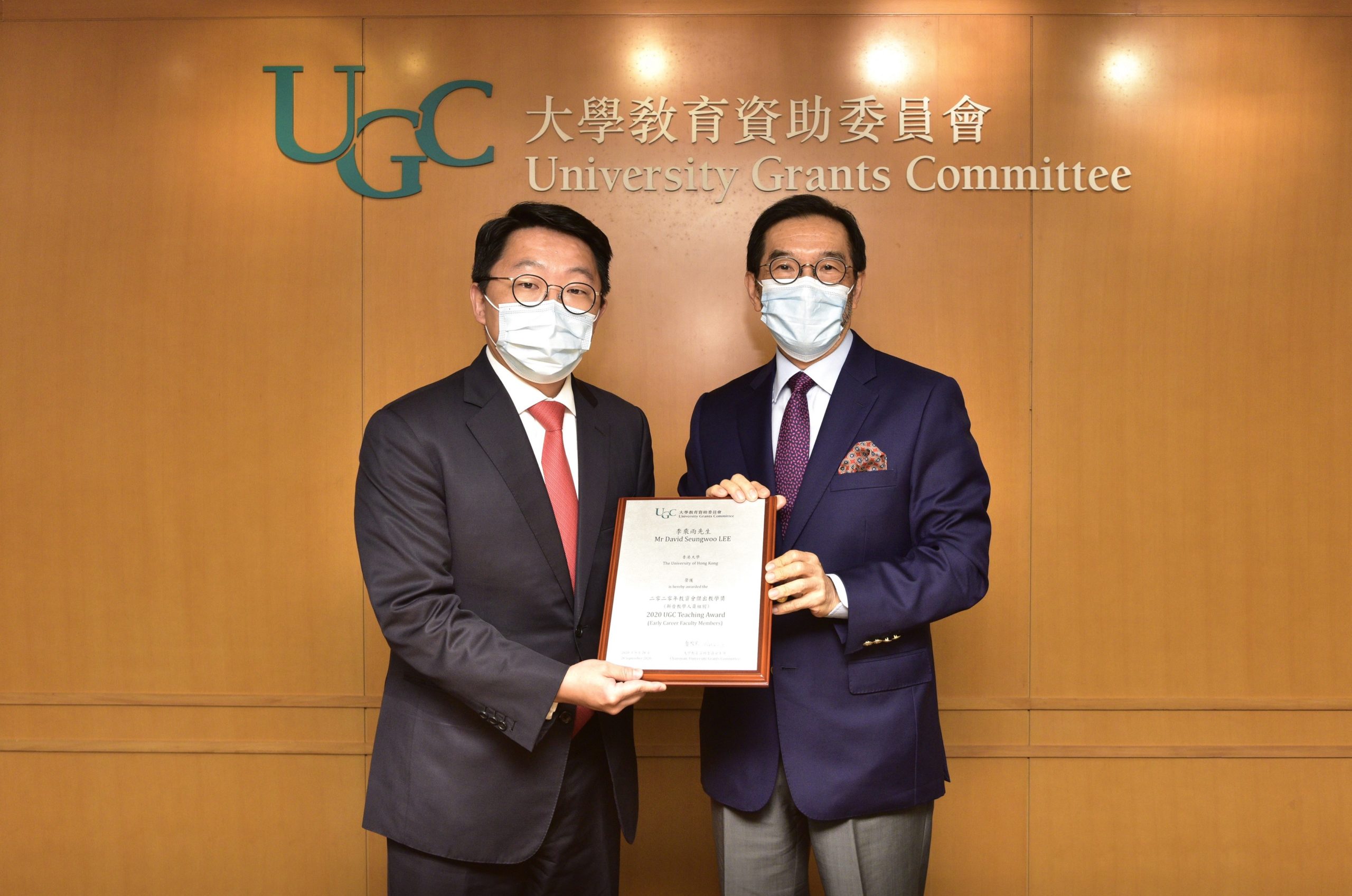
Mr Carlson Tong (right), Chairman of the University Grants Committee (UGC), presenting the 2020 UGC Teaching Award for Early Career Faculty Members to Mr David S Lee (left).
Future Leaders Pick HKU
A new scholarship to support students from developing countries in pursuing their dreams at HKU has attracted applications from some of the best students in the world, from countries as diverse as Ghana, Madagascar, Nepal, Nigeria, Belarus and Turkey.
The HKU Scholarship for Future Leaders, launched in 2019–20, provides full tuition waiver and an allowance for living and accommodation. Among the recipients was Michael Obeng, a Ghanaian student whose SAT score of 1560 placed him among the top 1% in the world. He is pursuing a Bachelor of Engineering degree and hopes one day to help find solutions to his country’s transportation problems, which include widespread lack of access to efficient transportation and a high motor vehicle accident rate.
“My dream is to use technology to put an end to motor accidents completely, first in my country Ghana and then the rest of the world,” he said. He hopes to learn how to apply nanotechnology to the problem.
Atilla Kaan Erisir from Turkey is studying for a Bachelor of Science after winning the Most Innovative Award at an HKU-sponsored international symposium on STEM education. He developed an AI-based blind stick after being inspired by a visually-impaired friend. The HKU event was his first encounter with Hong Kong and HKU.
“I learned that Hong Kong is a city very supportive of technological innovations. [And] I applied to HKU in particular because of its reputation as a leading university in Hong Kong and the world. I was also attracted by the flexible curriculum that allows students to mix and match courses in an interdisciplinary manner.” Atilla hopes to do research in molecular biology and biotechnology to help find innovative remedies for incurable conditions such as paralysis.
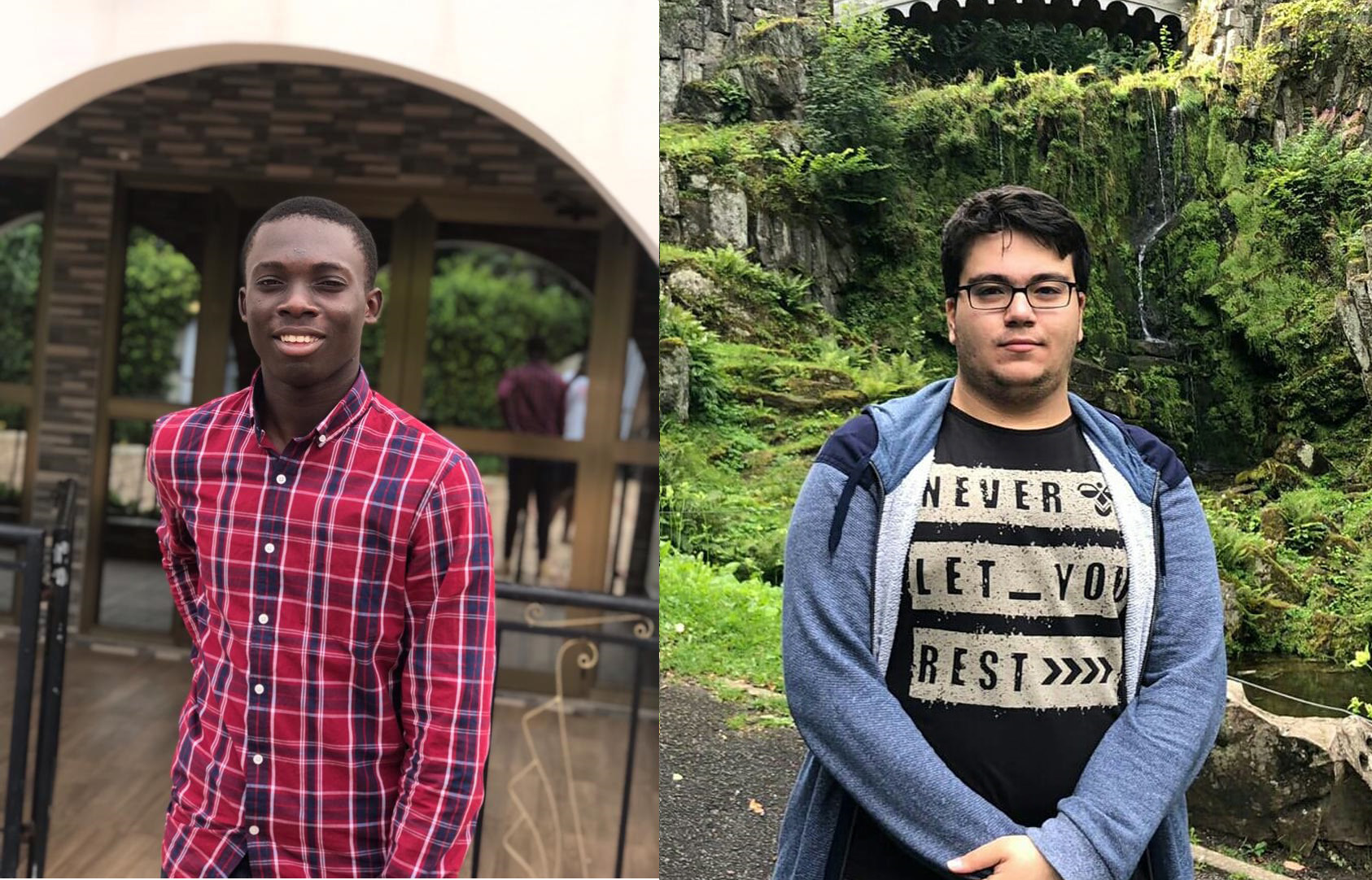
Michael Obeng (left) and Atilla Kaan Erisir (right) are among the four international awardees of HKU Scholarship for Future Leaders.